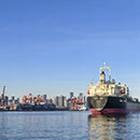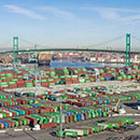
Will Waters | Wednesday, 24 November 2021
Although progress has been made to restore main routes to the Metro Vancouver and Fraser Valley regions, rail and road operations servicing the key Canadian west coast port remain impacted by the recent flooding in British Columbia
Rail and road operations servicing the Port of Vancouver remain impacted by the recent flooding in British Columbia (BC), although progress to restore main routes to the Metro Vancouver and Fraser Valley regions has been made in the last few days, and marine terminals at the Port of Vancouver are still operating.
In an operations update yesterday, the Port of Vancouver said “rail and highway infrastructure restoration work has re-established some key connections between the BC interior and the west coast. Anchorage demand remains high and truck operations at all container terminals remain steady”.
But it said the Vancouver gateway “continues to experience disrupted rail and truck movement due to flooding”, although “significant progress on repairs were made over the weekend on both rail and highway infrastructure”.
An operations update yesterday from shipping line Hapag-Lloyd highlighted that vessel delays, increased yard congestion and heightened anchorage demand are expected at Port of Vancouver for the time being.
Regarding GCT Delta Port Terminal, it said the majority of vessel operations have been idled until further notice, with no local export receiving until further notice, although the import CY gate remains open.
Meanwhile, at DP World Fraser Surrey, it said there were currently “limited operations”.
On the road side, the line said Highways 7, 99, 3 are now open for essential travel only, but
Highway 5 remains closed. And on the Rail side it said rail services were expected to re-start mid-week, but said “a re-start will entail a slow re-commencement and a lengthy recovery period is expected to clear the backlog”.
It reported that all CP Terminals in Canada – excluding Vancouver Intermodal (VIF) – are re-commencing acceptance of DRY Export loads (no reefers), excluding those to DPW Fraser Surrey. But for CN Rail, it said all exports destined to the Port of Vancouver are currently embargoed or not accepted.









